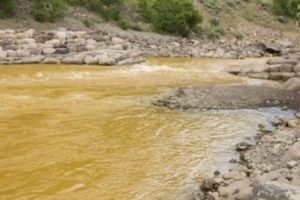The EPA continues to respond to requests for reimbursements from entities involved in remediating the Gold King Mine release, which occurred near Silverton, Colorado, on August 5, 2015. In the latest action, the Agency has issued guidance explaining its understanding of eligible response costs emerging from the incident, as that term is defined in the Water Infrastructure Improvements for the Nation (WIIN) Act, which was enacted December 16, 2016.

The Gold King Mine spill occurred when contractors hired by the Agency to stop the leakage of wastewater from the abandoned mine accidently caused the release of 3 million gallons of pressurized wastewater into a tributary of the Animas River. The Navajo Nation claimed that the contaminated water caused damage to crops and adversely affected wildlife. The EPA took responsibility for the spill. To date, the Agency has spent more than $29 million on immediate and long-term actions to address the incident. The EPA has also reimbursed more than $3.5 million for costs related to emergency response after the release.
The WIIN Act
The WIIN Act states that it is the sense of the Congress that the EPA “should receive and process, as expeditiously as possible, claims under chapter 171 of title 28, United States Code (commonly known as the “Federal Tort Claims Act”) for any injury arising out of the Gold King Mine release.” Reimbursement must be consistent with the National Contingency Plan (NCP)—the federal government’s blueprint for responding to both oil spills and hazardous substance releases—and is intended specifically to respond to any claim made by a state, Indian tribe, or local government.
Cooperative Agreements
States, local governments, and tribes generally receive Superfund money through cooperative agreements; however, the guidance notes that the intended recipients of the WIIN Act may not be able to meet the statutory and regulatory requirements to qualify for cooperative agreements. While not foreclosing the use of cooperative agreements, the WIIN Act provides a means for reimbursement of eligible response costs—those incurred either before September 9, 2016, or, with EPA preapproval, those incurred after September 9, 2016.
Reimbursement Criteria
The guidance lists the following criteria for reimbursement:
- Eligible response costs must relate to the Gold King Mine release.
- Costs incurred must be consistent with the NCP.
- Applications for reimbursement must still be accompanied by adequate documentation.
- Payment must still satisfy federal cost principles (i.e., necessary, reasonable, allocable, and allowable).
- Eligible response costs incurred through September 9, 2016, do not need prior approval from the EPA before the costs were incurred for reimbursement to be made.
- For costs incurred after September 9, 2016, the EPA should have approved those costs before the costs were incurred for reimbursement to be made.
Payment Schedule
The guidance also notes that costs submitted to the Agency no later than December 16, 2016, should be paid by March 16, 2017. Decisions on eligibility and payment for costs submitted after December 16, 2016, should occur within 90 days after receipt, presuming provision of adequate documentation.
Ineligible costs include those incurred for the construction of new infrastructure, purchase of emergency response vehicles not used during the response, hiring of new staff, and payment to outside counsel who may have been used to explore pursuing legal action against the EPA.
The guidance is here.
